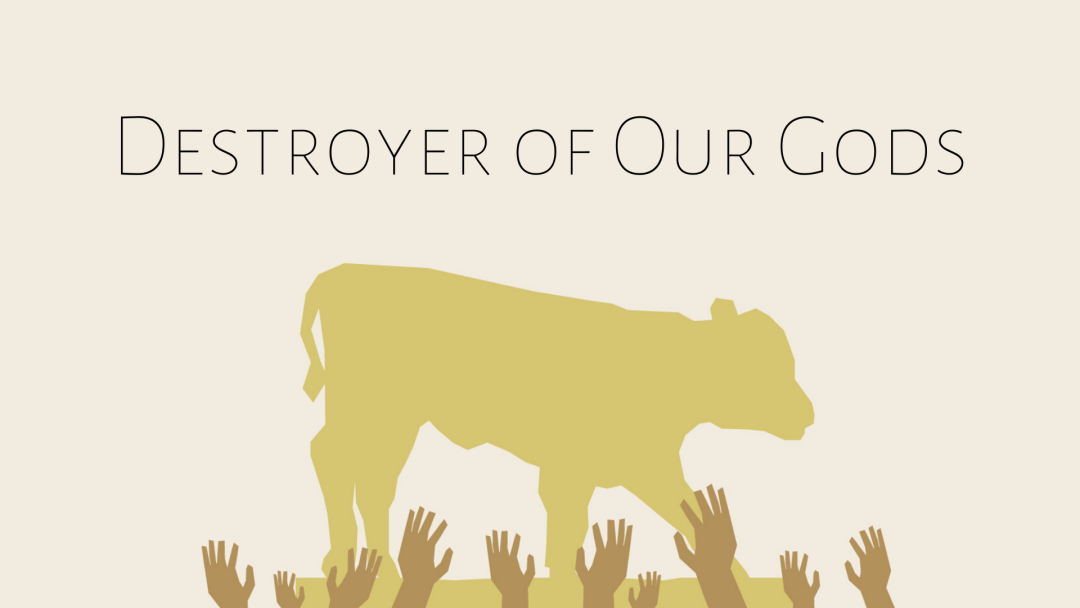
This Sunday we began a new sermon series called, “Against All Gods” where we’ll be examining the way that Yahweh confronts the idols of Egypt. As Mark and I have been talking through the themes we’ll be exploring these next few weeks, I couldn’t help but think one of the earliest accounts of martyrdom, outside of the New Testament. Recorded in a document known as, “The Martyrdom of Polycarp” it is an ancient account of the death of an elderly bishop who led the church in Smyrna. After his trial, at the time of his execution, Polycarp was presented before a crowd in the coliseum that angrily called for his death condemning him as, “…The teacher of Asia…the father of Christians, the destroyer of our gods.” I’ve always loved that line, because it captures a reality which is profound, namely the way in which Christianity addresses our personal idolatry.
Of course, when most of us consider idolatry, it has an Indiana Jones “Raiders of the Lost Ark” flavor. We conceive of idols as statues worshiped by people who think they represent beings with some spiritual existence. In many cases, that’s true, it’s certainly what’s happening in Egypt during the time of the Exodus. But the Bible sees idol making as a symptom of a much deeper problem, something that stands behind that impulse. The whole business of carving images to be worshiped is an expression of our fallen desire to find transcendent meaning in created things (Romans 1:19-21). It’s one of many ways of seeking glory from the creation that is only found in the Creator (Romans 1:21-23).
Old Testament scholar Christopher Wright gets to the heart of idolatry, stating that in making idols, “Creation is then credited with a potency which belongs only to God… God, who should be worshiped becomes an object to be used; creation, which is for our use and blessing, becomes the object of our worship.” This is a definition of Idolatry that runs much deeper that simply fashioning wood or clay, it is a sin that all of us are guilty of. In some way, each of us takes bits of the created world and fashions it into an idol to enthrone in our hearts. Wright again offers some helpful insight here, noting that literal statues and the idols of our hearts tend to be shaped by three particular concerns: What entices us, what terrifies us, and the things we need.
Ancient peoples often made gods out of the starry hosts of heaven precisely because they were enticing and inspired awe. We follow suit, making idols out of the people who dazzle us: celebrities, actors, artists, and preachers. In the midst of this, the author of Hebrews holds out Christ as, “The radiance of God’s glory” far more worthy of our delight and awe than the created things which He sustains by His powerful word (Hebrews 1:3). People of old worshiped the gods of the sea, fearful of the ocean's unpredictability. We go and do likewise as we lay awake at night, terrified of losing control over our lives and our possessions. Samuel cries out to us, with all of our misplaced terror, “Fear the Lord and serve him faithfully!” (1 Samuel 12:24). In Israel’s idolatry, she began to serve gods of rain and harvest believing that they would meet her material needs (Hosea 2:5). For us, in the west, there is no idol that promises greater comfort than materialism, and we frequently offer up our very lives and families on her altar. To our fretful concern over possessions, the Son of God declares in triumph, “Do not be anxious about your life… the Lord knows what you need!” (Matthew 6:25).
The crowd at Polycarp's execution were afraid of his message, and they should have been.
The Triune Lord that Polycarp served is the destroyer of the gods. He is relentless in his pursuit of his people. Yahweh will not allow us to be dazzled by created things and neglect the One who created them. The Holy One of Israel refuses to see us tremble in fear before anything less than His glorious majesty. The Giver of every good and perfect gift will not allow us to accept the mud pie of materialism when He offers to meet our needs and satisfy in abundance. But in each case, He does not leave us empty handed. He will destroy our idols, to be sure, but in the end, He gives us something better: Himself.
